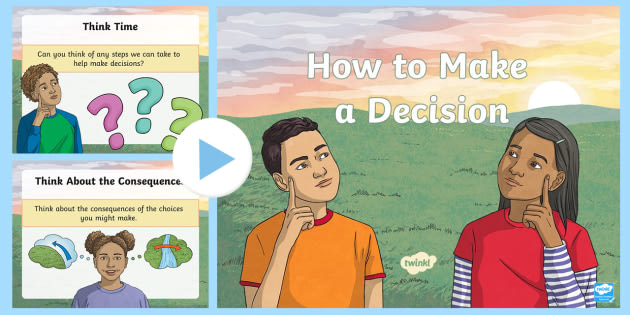Within this rapidly changing environment, the capability to make sound choices is more vital than it has ever been. Whether we are faced with minor decisions, such as what to choose for breakfast, or significant life-altering decisions, like switching jobs, the process of making decisions can be both empowering and overwhelming. Mastering the art of smart decision-making not only improves our individual and professional lives but also shapes the results we experience on a daily basis. Understanding the psychology behind effective decisions can offer us with valuable insights into our cognitive functions and actions, enabling us to make choices that correspond with our principles and objectives.
In exploring this topic, we'll explore 10 proven techniques that can improve your choices skills, equipping you to confront difficult choices with confidence. We'll look into the role of intuition and critical thinking, the significance of social intelligence, and strategies to avoid decision exhaustion. From learning to analyze options efficiently to understanding the concealed costs of indecision, this piece will offer practical resources aimed at enhancing your decision-making abilities process. Join us as we discover how to achieve better decisions under pressure and enable ourselves to handle life's complexities with clearness and intent.
Methods for Effective Decision-Making
Taking smart decisions is a capability that can be developed through practice and the adoption of tested techniques. One of the highly effective methods is to utilize decision-choosing frameworks. These frameworks guide individuals through a structured process, decreasing ambiguity and enhancing clarity. Common frameworks are the Pros and Cons List, the SWOT Assessment, and the Decision Grid, which help in breaking down complicated choices into manageable components. By organizing thoughts and weighing options in a systematic manner, one can navigate through choices with greater confidence.
Another important technique is to build emotional intelligence, particularly in understanding and managing emotions during decision-choosing. Emotions can significantly influence our decisions, occasionally leading to impulsive decisions or regrettable outcomes. By recognizing emotional triggers and learning to control them, individuals can evaluate situations with greater objectively. Additionally, slowing down the decision-making process through techniques such as mindfulness provides a clearer perspective, enabling better evaluations of the possible outcomes.
Lastly, developing a habit of reflecting from past decisions is essential for enhancing future choices. Reflecting on both positive and negative decisions provides insights into patterns that can be addressed for superior outcomes. Keeping a decision journal can be an effective tool; it helps track decisions made, the thought processes involved, and the results. Over time, this practice fosters self-awareness and enhances decision-making skills, ultimately resulting in increasingly informed and confident choices.
Understanding the Psychology of Decisions
The method of decision-making is profoundly rooted in the study of human behavior, impacting how individuals consider options and arrive at conclusions. Thinking https://peterashbysmith.com/how-a-coffee-shop-line-taught-me-effective-decision-making/ have a major factor, commonly leading in irrational choices based on feeling rather than rationality. For instance, the tendency to seek confirming information can cause people to support data that aligns with their pre-existing opinions, while ignoring data that disagrees with them. By grasping these cognitive distortions, individuals can aim at reducing their effects and making better decisions.

Another important aspect is the emotional element of the decision process. Emotions can blur decision-making, yet they also offer important understanding into core beliefs and needs. Emotional intelligence becomes crucial, as it empowers individuals to recognize and manage their feelings when confronted by tough choices. This skill not only helps in making choices that are in line with personal goals but also encourages resilience in dealing with the concern of having wrong decisions.
Additionally, the setting in which choices are determined significantly affects outcomes. High-pressure situations can cause hasty and possibly suboptimal decisions, while a peaceful environment promotes greater thoughtful decision-making. Methods such as being present and deliberate time-outs can improve clarity and facilitate more effective consideration of choices. By deliberately developing a favorable decision-making setting, people can boost their cognitive functions and eventually enhance their general decision-making capabilities.
Strategies for Assured Decision-Making
Establishing self-assurance in decision-making begins with recognizing your principles and objectives. By clearly defining what matters most to you, you form a foundation that shapes your choices. Contemplate on your future dreams and synchronize your decisions with your core values. This not only simplifies the decision-making process but also boosts your self-trust, as you can believe that your choices resonate with your authentic self.
Another efficient strategy is to gather relevant data while steering clear of information overload. Concentrate on obtaining data that directly impacts your choice and evaluate various perspectives. This balanced method helps you make knowledgeable decisions without falling victim to overthinking. Establishing a structured method for evaluating options, such as advantages and disadvantages lists or choice matrices, can also enhance understanding and reduce doubt in your decisions.
Lastly, engaging in mindfulness can significantly boost your decision-making capability. By cultivating mindfulness of your thoughts and emotions, you can discern between rational judgment and fear-driven reactions. Allowing a brief pause to pause and breathe before making a choice enables you to face decisions with a focused mind. This practice not just reduces anxiety but also leads to more considered and assured decisions, ultimately empowering you to embrace the choice-making journey.
